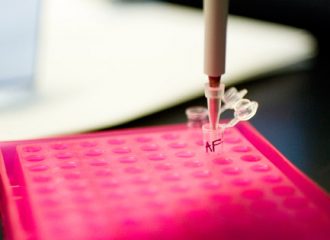Pharmacology and Drug Development Core
 The Rutgers CounterACT Center Pharmacology and Drug Development Core facilitates the development of therapeutics for treatment of skin, cornea and lung injury resulting from exposure to two high priority chemical threat agents, sulfur mustard and nitrogen mustard. This Core has been working closely with Center investigators to identify, characterize and prioritize drug candidates, evaluate the toxicological profile and pharmacokinetic properties of lead drug candidates, and determine optimal drug delivery approaches, with the aim of generating data to support Investigational New Drug (IND) applications and clinical trials.
The Rutgers CounterACT Center Pharmacology and Drug Development Core facilitates the development of therapeutics for treatment of skin, cornea and lung injury resulting from exposure to two high priority chemical threat agents, sulfur mustard and nitrogen mustard. This Core has been working closely with Center investigators to identify, characterize and prioritize drug candidates, evaluate the toxicological profile and pharmacokinetic properties of lead drug candidates, and determine optimal drug delivery approaches, with the aim of generating data to support Investigational New Drug (IND) applications and clinical trials.
The Core is organized into four focus teams, each serving a specific function critical to drug development: Preclinical Efficacy, ADME and Toxicology, Regulatory Affairs, and Translation to Advanced Drug Development. The current pipeline coordinated by the Core includes modulators of inflammatory targets including matrix metalloproteinases (doxycycline) TNF? (anti-TNF? antibody, pentoxifylline), inducible nitric oxide synthase (aminoguanidine), and COX-2/cholinesterase (NDH4338) that will reduce injury and/or promote healing of the lung, cornea, or skin following exposure to mustards. Drug products are rapidly progressing with several approaching readiness to transition to advanced development including clinical studies. These include drug products that have led to pre-IND meetings with the FDA office on Counter-Terrorism and Emergency Coordination Staff (CTECS) and the FDA’s Center for Drug Evaluation and Research (CDER). The Core partners with contract research organizations and pharmaceutical companies as well as regulators, to ensure the timely and efficient progression of products.
We propose the advancement of a number of first generation drug products (TNF? antagonists, doxycycline, and an NSAID prodrug) towards regulatory approval. Additional chemical entities in the pipeline continue to be studied as second generation drug products with improved efficacy. Greater utilization of the Core is anticipated in the next 5 years as the Center is moving a number of products into advanced development as countermeasures for mustard toxicities.
Key Researchers:
Diane E. Heck, Ph.D., Core Director
Lauren M. Aleksunes, Pharm.D., Ph.D., Director, Preclinical Science Group
Jules Mitchel, Ph.D., Director, Translational Group
Robert Casillas, Ph.D., Co-Leader, Preclinical Efficacy Focus Team
Michael A. Gallo, Ph.D., Co-leader, Preclinical Efficacy Focus Team
Patrick Sinko, R.Ph., Ph.D., Co-leader, ADME and Toxicology Focus Team
Glen Park, Pharm.D., Co-Leader, Regulatory Affairs Focus Team
Neal Simon, Ph.D., Leader, Translation to Advanced Development Focus Team
